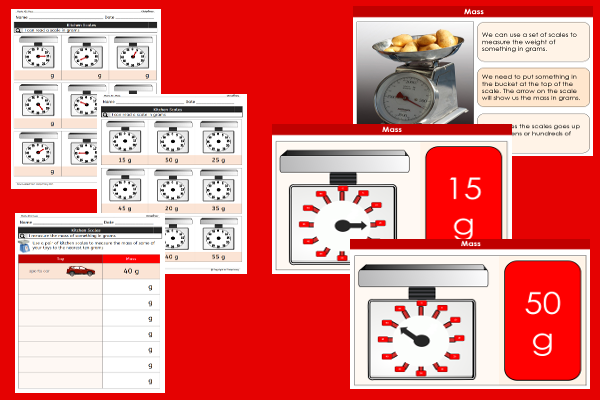Home > Key Stage One > Maths > Measurement > Mass > Kitchen Masses
Kitchen Scales

This maths teaching pack for Key Stage One gets the children to practise using a set of kitchen scales correctly to measure and compare the mass of different foods that have been stored in a kitchen working with units in grams.
The class can explain and model how to read and record the mass of the measured foods on a set of kitchen scales with divisions marked in grams correctly.
Download this teaching pack including classroom activities and an interactive presentation to practise using a set of kitchen scales correctly to measure and compare the mass of different foods that have been stored in a kitchen working with units in grams
Activities in this teaching pack include worksheets to practise reading and recording the mass of different objects using scale divisions for grams and a template to model how to use a set of kitchen scales to measure and compare the mass of different types of food in grams.
The interactive presentation gets the children to explore and record how to use a set of kitchen scales to measure and compare the mass of different types of food in grams.
This lesson is part of a maths scheme of work to get the children to identify and record how to measure, calculate and compare the masses of different things used in a kitchen working with units in grams and kilograms. There are teaching activities for shared learning, differentiated worksheets to support independent learning and interactive presentations to introduce concepts and key skills.
-

Garden Numbers
Identify and model some of the different calculation techniques that can be used when adding pairs of single digit numbers
-

Summer Stories
Practise composing and presenting narrative stories with familiar settings to illustrate the events and experiences that could happen during the summer
-

Fraction Numbers
Investigate how to use concrete equipment, diagrams and calculations to identify and record the matching fractions of different numbers
-

Family Holiday Lists
Explore how to compile sentences punctuated using commas to list some of the special things that families can use, complete and experience on a holiday
